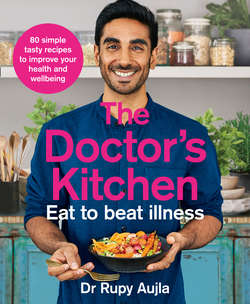Читать книгу The Doctor’s Kitchen - Eat to Beat Illness: A simple way to cook and live the healthiest, happiest life - Dr Aujla Rupy, Dr . Rupy Aujla - Страница 13
ОглавлениеEat to beat
Cancer
This was by far the most difficult chapter to write. Not least because it is a complicated topic to tackle, but also because it is an emotive subject matter and therefore the most controversial. However, I believe it is our responsibility as medical professionals to educate ourselves, appreciate the wealth of literature surrounding this complicated topic and share it responsibly with the public.
Our understanding of cancer biology is continually evolving and the deeper one goes into the literature, the more complex the systems that underpin this life-changing disease appear to be. Cancer can be loosely defined as a series of mutations that have spun out of control, leading to uncontrollable growth of cells. It’s really an umbrella term to describe lots of different types of cancers that can be caused by different things (like bacteria, viruses or UV radiation) and affect different parts of the body. Some cancers are the result of inherited genes, but most of them occur as we age and acquire more mutations. The processes that prevent these mutations from developing into cancer become less reliable with age, which is why we see most cancers in patients over 50.
Apart from the classic ‘eat a balanced diet’ advice, we, the medical profession, have traditionally been reluctant to delve into meaningful discussions about the role of food and lifestyle as chemopreventative. A chemopreventative is a natural or synthetic substance that reduces the risk of cancer (examples included drugs like Tamoxifen to prevent certain types of breast cancer163), but food is generally not accepted as one. The argument against labelling food as potentially cancer protective is that there are simply not enough clinical trials yielding irrefutable, large-scale evidence. But considering how much we already know about the impact of diet and lifestyle, I sincerely hope this will change.
The lack of dialogue has created a vacuum of information that has, on occasion, been willingly filled by unqualified health commentators who have led people astray. It is this taint that continues to mark cancer and nutrition as a taboo subject. But it is time to redress the balance and normalise the conversation around food and cancer. In my opinion, it is simply inexcusable to say ‘nutrition has no role in cancer prevention or management’. This chapter is by no means comprehensive, but it should give you an idea of why I’m so passionate about this subject matter and the need for more robust nutrition and lifestyle advice within the field of oncology.
